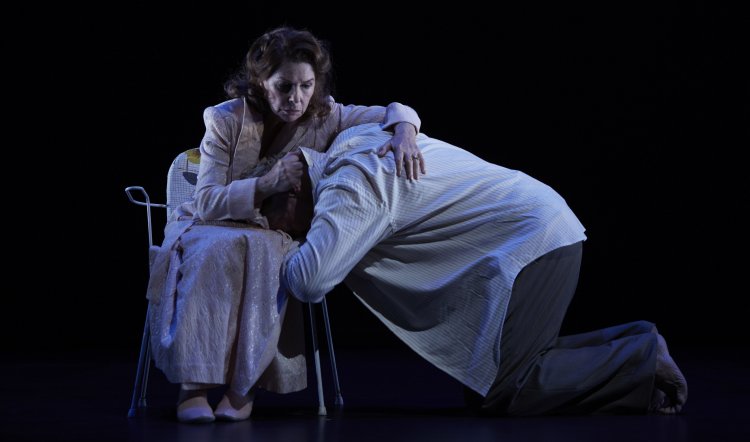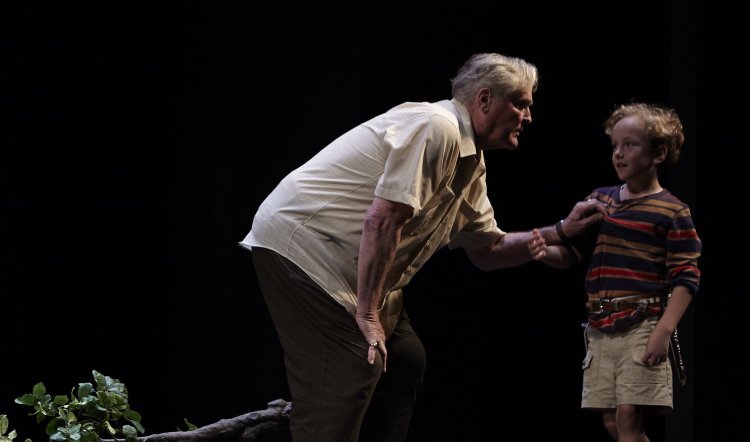
ALL MY SONS
ALL MY SONS, Sydney Theatre Company at the Roslyn Packer Theatre, 4 June-9 July 2016. Photography by Zan Wimberley - above: Robyn Nevin and John Howard; right: John Howard and Jack Ruwald.
Resident director Kip Williams scored a triumph in 2015 with the techno-dazzling and humanly brilliant Suddenly Last Summer, and this year has already given us the sumptuous and revealing The Golden Age. No pressure then in bringing to the stage this production of Arthur Miller’s first critical and box office hit from 1947.
John Howard and Robyn Nevin lead the company as Joe and Kate Keller whose successful business, family and home are the epitome of the post-WW2 American dream. Their son Chris (Chris Ryan), safely returned yet mentally anguished from the war, is working with his father and will inherit some day. They have friendly neighbours – local doctor Jim Bayliss (Bert Labonte) and his wife Sue (Anita Hegh) on one side, Frank and Lydia Lubey (John Leary and Contessa Treffone) on the other. Life is good.
The play opens, nevertheless, with a moment of ill omen. In the early hours of the morning a small, fruit-laden apple tree in the Kellers’ back yard is snapped in two by a gust of wind. The insomniac Kate witnesses the destruction. It is the third anniversary of the death of her eldest son, air force pilot Larry, and the tree had been planted as his memorial.
Kate believes Larry is alive, however, and refuses to allow any talk of his death: newspapers are full of stories of men returning after years of being lost in action, she insists. Frank Lubey is preparing Larry’s horoscope for her, having given her fresh hope: Larry’s crash occurred on the most auspicious day in his calendar, so he can’t have died then. Tough, no nonsense Kate will have no truck with any suggestion that this might not be the most useful or likely idea.
Her dogged beliefs and blind faith also encompass her husband and events that were as shattering as Larry’s disappearance: the deaths of 21 young fighter pilots in planes with a faulty engine part produced by the Keller factory. Joe’s partner Steve Deever had been held responsible for the flaws and while both men were indicted it was Steve who went to jail, Joe who was exonerated.
Steve’s daughter Ann (Eryn Jean Norvill) was Larry’s sweetheart and has cut herself off from her father since his sentencing. She arrives for a visit, at Chris’s invitation. He has long been in love with her and they have been writing to each other since she moved away from the familial misery to New York city.
Chris’s wish to marry Annie is a knife in the heart to his mother. Kate insists that like her, Ann is waiting for Larry to come home and is appalled and disbelieving on discovering it isn’t so and that Annie wants to marry Chris. Her brittle facade begins to crumble along with the illusion of happy family life. The latter’s disintegration gains momentum when brash, sharp Sue Bayliss lets it be known that the neighbourhood believes Joe was complicit in the aircraft tragedy and let his partner take the rap.

The stark set, by Alice Babidge, is a vastly looming house exterior whose blind, staring windows and charcoal-dark walls are the antithesis of white clapboard, sunny suburban US of A. Nick Schlieper’s understated lighting scheme makes only minimal differences between day and night, instead subtly suggesting the gloom and sense of foreboding that steadily grows as the house – virtually threatening its occupants and the audience and close to the front of the stage – gradually recedes, along with optimism.
Kip Williams again makes magic with Robyn Nevin and Eryn Jean Norvill (both brilliant in Suddenly Last Summer and equally so here in outstanding performances). Chris Ryan is also powerful as the damaged yet hopeful young man, while John Howard is at first avuncular and loveable before slipping close to infantilism as the past re-emerges along with Annie’s brother George (Josh McConville). George is the avenging angel whose late arrival is the inevitable moral and emotional bombshell that powers the play through to its overwhelming conclusion.
In support, Anita Hegh, Bert Labonte, Contessa Treffone and John Leary are as fine as required by the leading performances. The entire ensemble serves the play with intelligence and clarity: where there is humour the audience laughs, for the rest of the two-plus hours, there’s not a movement in the house – all are riveted to the unfolding tragedy.
Also integral to the production is Max Lyandvert’s evocative and fine-drawn score and – as so often – resident voice and dialect coach Charmian Gradwell’s invisible work (and acting in her two week absence, Jennifer White). It sets the voices in middle America without apparent effort, which is remarkable.
The role of neighbourhood lad Bert is shared by Jack Ruwald and Toby Challenor. On opening night young Jack was utterly charming and undoubtedly his godmother and mother – in the audience – were madly proud of him.
This production is solid gold and highly recommended for Arthur Miller fans, theatre fans and anyone craving grown up entertainment.



